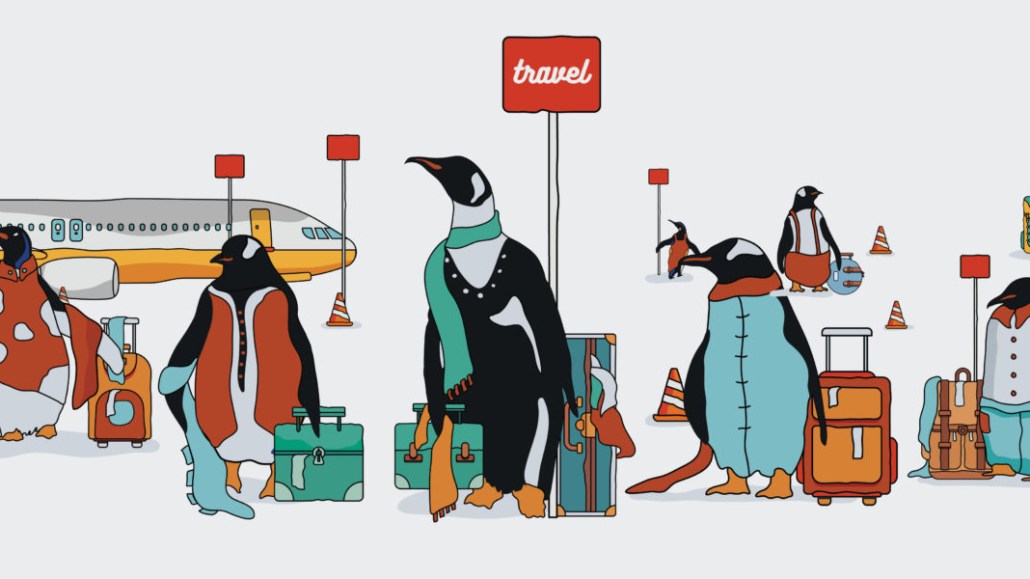Secure your place at the Digiday Media Buying Summit in Nashville, March 2-4

While most travel advertising has been grounded, airlines, hotels and booking services are still marketing, turning to inspirational strategies that look to gently stoke demand for the day when people can get around again.
Instead of the typical mix of television or digital ads touting the latest deal, travel brands are sending out email newsletters suggesting destinations to dream about, offering a virtual experience of travel destinations and creating custom Zoom backgrounds.
In recent weeks, JetBlue has started to curate a virtual travel experience on its blog with what it is calling “Wander From Home.” The posts give would-be travelers a sense of the entertainment and activities that they would be able to be a part of if that had gone to Puerto Rico or Mexico or whatever other destination JetBlue has added. The posts are just one element of the light marketing that JetBlue is currently doing. The company has also created an informational video series for children, JetBlue Jr., to help parents keep children entertained at home while also teaching children about flying.
“Whether our goal is to inform or inspire, as travel providers we are committed to maintaining clear, helpful, and informative communications with our customers so they know what to expect when they are ready to travel with us again,” said Elizabeth Windram, vice president of marketing at JetBlue. “Brands need to continue to engage with their customers, acknowledging the new normal and finding ways for their brand to remain relevant.”
Currently, the airline is focused on organic reach through its social channels, emails and other owned channels, said Elizabeth Windram, JetBlue’s vice president of marketing. When asked when the airline will return to advertising as it had been before coronavirus, Windram said that JetBlue was “focused on finding new ways to connect with our organic social audiences who are eager for content that allows them to plan for future travel.”
In mid-March, hotel booking service Tablet has shifted its overall marketing strategy. Instead of being “advocates of travel” the company retooled its marketing to be a “utility and a distraction,” said Lucy Lieberman, chief marketing officer, Tablet, adding that the goal was to keep customers engaged and ensure future bookings.
Tablet reduced its weekly newsletter output from four to one and changed the content to be focused on highlighting hotels and destinations to think about traveling to in the future. The company also created Zoom backgrounds of various hotels and put together a list of hotel gift shops for travelers to buy from.
The company has used a “tiny bit of paid social to find like minded travelers looking for a distraction” to promote these efforts, said Lieberman. Overall, Tablet has reduced its marketing budget to be just about 5% of what it typically spends. When asked when Tablet will return its advertising to pre-pandemic levels Lieberman said that still unclear but that it could be in the fourth quarter of this year or could be next year.
Aside from airline and hotel brands, tourism boards are looking for ways to engage people during this time as well. For Experience Kissimmee, the Florida tourism board for Kissimmee, advertising agency Zambezi has been exploring ways to do just that. One option is to send out informational newsletters about alligators as Kissimmee has a gator park, said Grace Teng, executive director, Media & Analytics at Zambezi.
By focusing on information and inspiration, travel marketers are able to talk to consumers in ways that are appropriate for the moment. “People are beginning to put their toes in the water,” said Matt Hofherr, chief strategy officer and co-founder at Muhtayzik Hoffer, adding that light marketing tactics make sense as people are still thinking about travel even if they aren’t buying tickets. But the marketing has to change. “If you’re a travel brand right now you can’t plan your media based on behaviors of last year,” said Hofherr. “Everything has changed. All bets are off.”
More in Marketing

Future of Marketing Briefing: AI’s branding problem is why marketers keep it off the label
The reputational downside is clearer than the branding upside, which makes discretion the safer strategy.

While holdcos build ‘death stars of content,’ indie creative agencies take alternative routes
Indie agencies and the holding company sector were once bound together. The Super Bowl and WPP’s latest remodeling plans show they’re heading in different directions.

How Boll & Branch leverages AI for operational and creative tasks
Boll & Branch first and foremost uses AI to manage workflows across teams.







